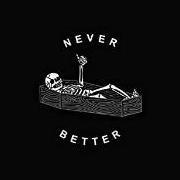-
Posts
1,534 -
Joined
-
Last visited
-
Days Won
4
Neist last won the day on May 14 2016
Neist had the most liked content!
Profile Information
-
Location
Oklahoma
-
Application Season
Not Applicable
-
Program
History of Science / LIS
Recent Profile Visitors
5,320 profile views
Neist's Achievements

Cup o' Joe (10/10)
447
Reputation
-
I still live in the greater OKC area, though I sadly cannot comment directly in regards to city life in the last couple years. Been rather a shut-in! That said, for one person, $50k is probably fine for an individual, but that's going to depend on your standard of living. I've supported a family of three, renting an entire house, for about $60k. It's not an especially high cost of living city. The Norman area, where OU is located, is a great area, but it's definitely going to be around a 30 minute trek to get to downtown Oklahoma City. More so during rush hour. I'm not sure if I can answer any of the other specifics, but if you have any additional questions, I'll keep an eye on this thread. :)
-
 Phoenix88 reacted to a post in a topic:
If I knew then what I know now (Officially Grads version)
Phoenix88 reacted to a post in a topic:
If I knew then what I know now (Officially Grads version)
-
 Phoenix88 reacted to a post in a topic:
If I knew then what I know now (Officially Grads version)
Phoenix88 reacted to a post in a topic:
If I knew then what I know now (Officially Grads version)
-
 MettaSutta reacted to a post in a topic:
Library Science Applications Fall 2018
MettaSutta reacted to a post in a topic:
Library Science Applications Fall 2018
-
 The Wordsworthian reacted to a post in a topic:
Grad. School Supplies?
The Wordsworthian reacted to a post in a topic:
Grad. School Supplies?
-
 Karlin reacted to a post in a topic:
Getting off the Waitlist
Karlin reacted to a post in a topic:
Getting off the Waitlist
-
 coursera reacted to a post in a topic:
Qualifications for History of Science & Technology
coursera reacted to a post in a topic:
Qualifications for History of Science & Technology
-
 bibliophile222 reacted to a post in a topic:
Venting Thread- Vent about anything.
bibliophile222 reacted to a post in a topic:
Venting Thread- Vent about anything.
-
 bibliophile222 reacted to a post in a topic:
Venting Thread- Vent about anything.
bibliophile222 reacted to a post in a topic:
Venting Thread- Vent about anything.
-
Contact your school's disability resource center (or whatever the like organization is called where you go to school). Obviously, we don't know the entirety of the situation, and intentions could potentially be misconstrued, but it's at least possible that if what she said was targeted at you, then she could be breaking the ADA (at least if you live in the United States, though I'm sure other countries have similar laws). I was recently diagnosed with Panic Disorder while in graduate school, and I don't think I would have survived without my school's DRC. In fact, it's escalated to a point this semester that if I don't lean upon them I think it's unlikely that I'll complete my degree.
-
I've probably listened to more podcasts than a human being ever should, and by far, my favorite is the Memory Palace. Great podcast if you love history.
-
You should be fine if you have limited experience in the subject as long as you demonstrate in your application materials precisely why you want to study it. Also, knowing and referencing active scholars in the your specialty is a big plus in your application materials. Very few universities have undergraduate programs in the history of science, and only a slightly larger pool of universities employ faculty members who teach courses in the history of science, let alone any particular facet in the history of science. In the contingent of students entering into my program when I did, out of five of us, I was the only student with any extended Oh, and I should also add that some programs do require some familiarity with the sciences, but these programs tend to be more uncommon than ones that do not.
-
Just to stick a nail in that coffin. I'm in a double degree program which requires a profoundly long period of time to degree. I won't take comps until, roughly, Spring 2021. So, yeah.
-
Sure, I guess? You've been very congenial, but not everyone has. Why would I willingly engage a hostile situation? Willing disengagement is a choice, and I don't consider that choice the same as surrender, though I won't fault you for thinking otherwise. Your first point makes perfect sense, but again, I can assure you, I'm definitely not looking for advice. I was looking for fellowship. Perhaps a poorly worded seeking of it, but that's what it was. I have plenty of failings, and an inability to communicate effectively is definitely one of them. Further, people repeatedly trying to convince me that they know my intentions more than I do is rather insulting. Who has the gall to think that they know another person better than that person does? Conclusions? My conclusion is that this forum is a far less friendly place than I imagined it, and if those responding to this post are a representative sample of historians in general, I need to seriously reconsider becoming a historian who works within the historical discipline because there are plenty of disciplines within which I can produce historical scholarship. Again, you've been congenial, and I greatly appreciate it, but again, some were certainly not. I'm really disappointed in this community if this is the way it is deemed acceptable to treat others. And I'm doubly disappointed considering that some of the most long-standing members took part in this behavior.
-
 Neist reacted to a post in a topic:
The Borders of "Acceptable" Historical Method and Perspective
Neist reacted to a post in a topic:
The Borders of "Acceptable" Historical Method and Perspective
-
As I stated previously, I wasn't really looking for answers, but I admit, this is likely the best comment I've yet received in this thread. Thanks a bunch. I've actually already attended some Rare Book School courses. They are great experiences, but I'm somewhat conflicted about attending more given how expensive they are. I received a more than a generous scholarship for the last class I attended, but it was still rather pricey. I might consider applying for the fellowship program once I'm a doctoral candidate; it allows one to take the courses free of tuition.
-
Well, I'm not surrendering? Sure, I don't feel the need to receive the approval of every scholar I meet, but I'm pretty certain that's par the course in the humanities. We don't agree. Frequently. Sure, there's a certain decorum where two might mutually disagree amicably, but I know I'm not the only person who's witnessed very intense professional feuds, even within the same department (I've been in some very uncomfortable meetings....). Academics aren't hired because they get along. They're hired because they know a lot about something and, hopefully, have the skills required to teach others that something. Also, I think this might be key to some of the miscommunications in this discussion. I think some people think I'm seeking answers or advice. I am not. I just wanted a discussion and perhaps some camaraderie between fellow graduate students about the issues we face. Re-evaluate? What exactly? A lot of @Sigaba's post presupposes so much about who I am (which, just to clarify, is very much off-base and occasionally, borderline offensive), that, quite frankly, I don't know how to respond. If I respond to these mild suggestions then I affirm his view about who I am. I don't need to validate myself to a bunch of strangers online. Nor do I have the time to.
-
Certainly, the latter. But for whom isn't that an issue? There is as much of a struggle articulating my thoughts as another person will have interpreting those thoughts. Communication is hell, and written communication is routinely inadequate. Case in point, the previous post by @Sigaba. You really pulled all of that from a few hundred words and vague comments on a message board post that was casually written? I think you're reading a bit deep there, buddy. As someone who suffers from quite a bit of mental health issues myself, I think you should talk to someone if your vitriol runs so deep that you feel compelled to project that much hatred onto others. A great deal of what you've stated is assumptions based on casual statements devoid of any person-to-person interaction. You have no idea who I am or my relationship with my advisors. You have no idea how I perceive myself or how I perceive the merit of my work. You immediately assumed I believed myself better than others, which, just so it's out there, is certainly not the case. I can't even engage with you. How do you engage with someone who assumes you're someone you're not? And quite frankly, I'm sickened that you'd spend this much effort trying to break someone down. I'm done with you. I refuse to engage further.
-
 Neist reacted to a post in a topic:
The Borders of "Acceptable" Historical Method and Perspective
Neist reacted to a post in a topic:
The Borders of "Acceptable" Historical Method and Perspective
-
To be frank, my response was a struggled and diplomatic attempt to respond to replies which I consider ranging from slightly patronizing to entirely off-base. Indeed, some of the comments are so wholly off-base that I'm uncertain how politely to respond. But then again, I feel obliged to answer as I believe it impolite not to regard comments which were written in good nature, even if possibly unintentionally off-point. How should one respond to comments which imply increasingly codified assumptions about one's intentions? How am I supposed to politely say, "Actually, I'm not talking about that..."? How am I supposed to say, "Isn't it perhaps a stretch that you assume that, specifically, is my concern?" How does one politely articulate "Yes, I've already considered everything you've written, extensively" without a "Nu-uh, I don't think you have!" response? I'm thankful for the good nature inspiring the replies, but very little of the advice given here is especially profound or relevant. So here I am, at a loss. Consider this a second attempt at my struggled attempt at diplomacy.
-
Thanks for the responses, everyone. I apologize for being deliberately vague, but considering a rather large of my research is a methodological defense of my work, one can't honestly expect me to work expend the effort typing it out here. Though, I'll briefly state that some of your advice, while worthwhile, is not relevant to my particular case. First, I don't consider myself a historian. I consider myself a bibliographer who works historically. There is somewhat of a distinction, and the distinction is a larger discussion than what I, unfortunately, have the time to discuss here. But regardless, bibliography is very much a different way of producing scholarship. My committee supports my work, but my committee is somewhat of a unicorn. I don't feel as if, very generally, historians consider my work worthwhile. Second, as I've stated before, I likely will work in libraries, so ultimately, it doesn't matter what other historians think of my work. All that matters to me is that I produce historically sound work. I'm not planning on playing disciplinarity politics, which to be honest, has turned me away from working in academia in general. People are so catty. Again, thank you for your responses.
-
 Neist reacted to a post in a topic:
The Borders of "Acceptable" Historical Method and Perspective
Neist reacted to a post in a topic:
The Borders of "Acceptable" Historical Method and Perspective
-
True, but I, unfortunately, suffer from interests in highly studied areas. If I had to generalize, I'd state that I study the history of books, evolutionary theory, and progressive era United States. The latter two are somewhat saturated fields.
-
 Neist reacted to a post in a topic:
The Borders of "Acceptable" Historical Method and Perspective
Neist reacted to a post in a topic:
The Borders of "Acceptable" Historical Method and Perspective
-
 Neist reacted to a post in a topic:
The Borders of "Acceptable" Historical Method and Perspective
Neist reacted to a post in a topic:
The Borders of "Acceptable" Historical Method and Perspective
-
Eh, well, the most general issue I encounter as I perceive it is that I'm a book historian who is more interested in the "message" than the "messenger". I consider books as cultural artifacts and believe they can be and should at least be considered important materially distinct from those who have created them, just in the same way that a magazine advertisement of a woman in the 1950s smoking a cigarette while cooking a meal is historically interesting beyond as to who created that advertisement. I see books as potentials of what could be known, not as evidence of what a person conceived as being known or worthy of being known. It's a subtle distinction, but a lot of the critiques I receive about my work, while valid, presuppose a different approach than that which I'm attempting to formulate (the specific method of my work is somewhat novel, and while known historians have used it, I'm plowing untowed ground). In short, I foresee having to dedicate more space in my dissertation than preferable defending the methodological framework I'm developing. Perhaps an entire chapter. I'm not concerned with the job market because I'm nearly sure I won't work in a history department. I had a reasonably long professional career in libraries before attending graduate school, and the program I'm attending rewards an MLIS along with my history degree. That and job prospects in the history of science are beyond dismal. I think what I'm going to have to do is just write up a methodological essay discussing how I intend to study books and the literature supporting the worthiness of said approach. Maybe such a composition can be an eventual component of my dissertation.
-
That is precisely the sort of situation I'm faced with regularly. Professor A: "What do you want to write about for your final paper in the course?" Me: "I want to write about X, Y, and Z." Professor A: "But that's useless, and it doesn't tell us anything." Me: "Yes it does, let me try to explain it..." Then I'm forced to both explain it in person and spend a significant portion of my paper defending my work, to which I'll likely be criticized for spending far too long describing my work. I think I'm just going to have to sort of adopt a benign apathy to the criticisms and tally forth with the work I want to do.
-
Now that I'm into my third year, I'm increasingly confident that the framework in which I view historical narratives is sound and worthwhile. However, I've simultaneously realized that the framework that I value is not a framework that I find others tend to value. Has anyone else encountered a similar situation? I feel as if I'm constantly required to defend my methodological approaches to my work. It's somewhat tiresome.




